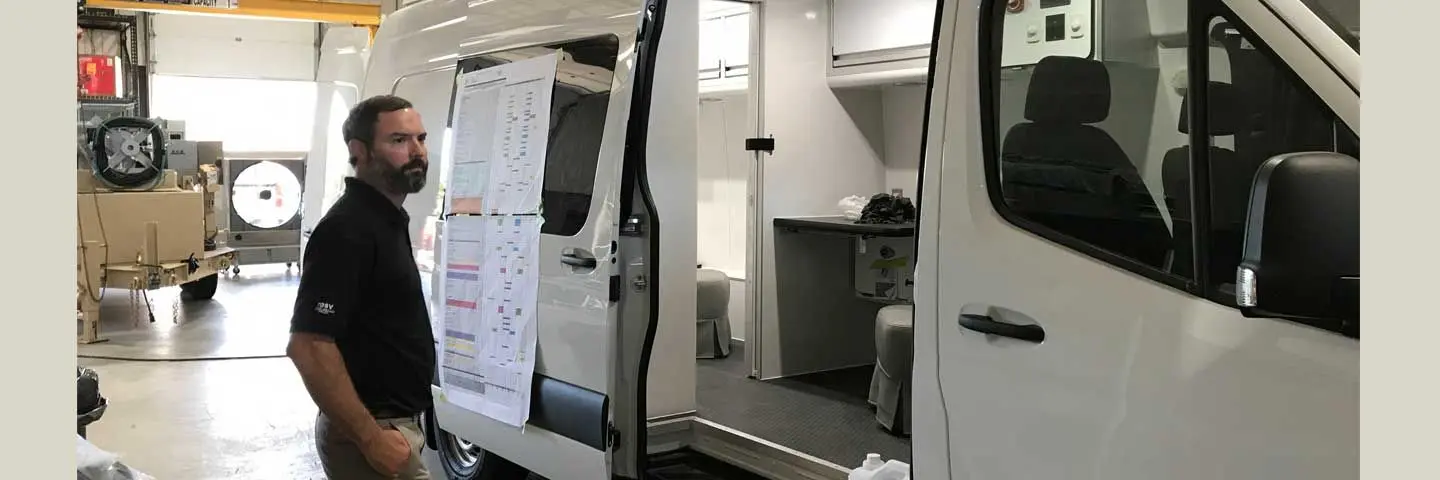Maryland-made custom vehicles help protect first responders
12/03/2019| Daniel Leaderman
Article Topics:
Maryland-made custom vehicles help protect first responders
12/03/2019 | Daniel Leaderman
Clients of TechOps Specialty Vehicles all approach the company with their own mission in mind. A local health department might need a special van equipped to serve as a mobile doctor’s office; a law enforcement agency might need a mobile command center with an array of communications and surveillance equipment; other clients might need portable laboratory space, or search-and-rescue vehicles.
In addition to government and military agencies, TechOps also serves commercial clients who need vehicles for delivery, promotion, and other uses. But keeping people safe is the company’s primary mission, according to director of business development—and retired Anne Arundel County deputy police chief—William R. Krampf.
“We build vehicles to protect first responders so they can go out and protect people in their jurisdictions,” Krampf said.
Whatever clients need, the Stevensville-based business will help them do it by customizing a broad range of vehicles, from pickup trucks to high-top vans to busses and large RVs.
“There’s usually a design element to what we’re doing,” said TechOps president Jon Brianas, a Maryland native and graduate of the U.S. Naval Academy. “Often times it involves integrating a variety of technology solutions.”
One recent military customer needed a vehicle to assist with disposing of explosive ordnance, which meant they needed a large trailer with a workspace in the back that could withstand an explosion, Brianas said. This meant all the fixtures had to be extremely robust; electrical wiring, for example, was covered with a heavy metal rather than the usual plastic conduit.
This project illustrated a common request of TechOps clients, Brianas said. They’ll explain what they do in a laboratory setting, then ask Brianas and his team to help them put that same operation in a van or trailer.
Sometimes, clients won’t initially have a clear idea of what sort of vehicle they need, they’ll just know what they need it to do; TechOps will then present a design that meets those needs. Once the client approves, the company’s crew of welders, fabricators, electricians, carpenters, and other tradespeople get to work.
Other recent clients have included two Maryland counties that needed mobile medical outreach vans—vehicles that can get health department personnel out in the community to deliver services to residents. Such a van might include a comfortable chair in which patients can be examined and get blood drawn, and a separate area with a small desk and chair for the medical staff to use as an office.
Krampf predicts more and more jurisdictions will embrace this method of delivering public health services in the future, since it costs less than establishing a brick and mortar facility and can bring services directly to vulnerable populations who may not have easy access to transportation.
“This is going to be a pretty big thing in the next three to five years,” Krampf said. “We’ll be doing a lot more of those.”
Each project is unique, but a fully-equipped van, including the vehicle itself and any modifications the client wants, won’t cost more than $150,000. That’s not much, considering the overall annual budget of most counties, Krampf said.
“Imagine the outreach you’ll get out of one van,” he said.
Krampf also believes that state and local jurisdictions will increasingly want to save money by retrofitting existing vehicles, such as an older van or ambulance, so they can be used for a new purpose—a service TechOps will gladly provide.
“We're building vehicles to save lives,” Krampf said. “I’m proud of that.”
Keep up with the latest.
Sign up for e-mail notifications.
